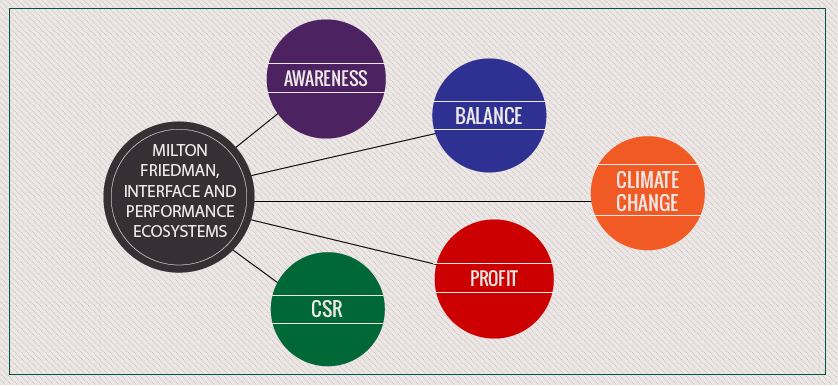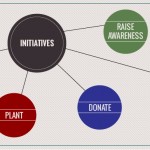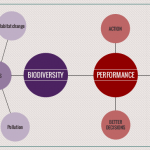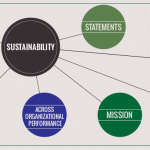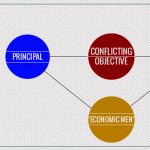Milton Friedman, Interface and performance ecosystems
smartKPIs.com Performance Architect update 40/2011
There is widespread awareness today about the climate change and other environmental issues we are facing today at a global scale. In a simplistic way, I would categorize companies in three categories: the ones that don’t care, the ones that do something about it and the ones in the middle.
Perhaps the largest group is formed of the companies that don’t care, adepts of the principle that there are out there suitable institutions (government, UN bodies) to do something about these issues. This group is embodied by Milton Friedman’s quote in his notorious 1970 New York Times Magazine article, The Social Responsibility of Business is to Increase its Profits:
“There is one and only one social responsibility of business–to use it resources and engage in activities designed to increase its profits so long as it stays within the rules of the game, which is to say, engages in open and free competition without deception or fraud.”
Unfortunately, human behaviour oftentimes has difficulties with finding a balance and all too often issues with traffic of influence, deception and fraud emerge as unwanted consequences of the profit driven behaviour. Many organizations are doing something about it. At the forefront of sustainable business practices is Interface, the world’s leading producer of soft-surfaced modular floorcoverings. Its mission embodies an emergent approach to sustainability as a value driver for the business:
“Interface will become the first name in commercial and institutional interiors worldwide through its commitment to people, process, product, place and profits. We will strive to create an organization wherein all people are accorded unconditional respect and dignity; one that allows each person to continuously learn and develop. We will focus on product (which includes service) through constant emphasis on process quality and engineering, which we will combine with careful attention to our customers’ needs so as always to deliver superior value to our customers, thereby maximizing all stakeholders’ satisfaction. We will honor the places where we do business by endeavoring to become the first name in industrial ecology, a corporation that cherishes nature and restores the environment. Interface will lead by example and validate by results, including profits, leaving the world a better place than when we began, and we will be restorative through the power of our influence in the world.”
The financial results of Interface prove that embracing sustainability translates into excellent financial results. The gross profit as a percentage of net sale was at over 33% for the last 5 years. In terms of stock performance, for the five-year period ended January 2, 2011, its total returns to shareholders (stock price plus dividends, divided by beginning stock price) outperformed both the NASDAQ Composite Index and competitors (Self-determined peer group of 13 stocks). For $100 invested in January 2006, Interface delivered a cumulative total of return in January 2011 of $197, compared to $ 126 for NASDAQ and $80 for competitors.
For the organizations that are in the middle and are exploring options, an important point to realize is that today’s interconnected society is much different than the one in 1970. Running successful organizations in the 21st century, requires a different mentality and management thinking compared to the 20th century. The level of complexity, speed of doing business, transparency and consumer influence is unparalleled. Continuous change and integration are the new value drivers in today’s business environment. Even separating the business environment from the environment overall is not an option. Natural disasters, climate change and environmental footprint are key to the viability of business ecosystems.
Especially as the efforts of government and non-profit organizations are not enough to deal with the complex issues surrounding our environment, it is time for corporations to take a more active role in addressing sustainability for both the survival of their business and the protection of the Earth ecosystems overall. Considering that everything we do is possible due the resources provided by Planet Earth, a moral “Earth tax” on the use of these resources is a duty at both personal and organizational level. Efforts in this direction already exist at institutional level, a recent example being the Carbon tax scheme intensely debated in Australia this year. However complementing these efforts with a grassroots global commitment to sustainability would be exponentially more effective. The foundation for such an approach is the belief that sustainability is today a key value driver of organizational performance. The sooner companies will adopt this the better it will be for all the actors in the ecosystem.
Aurel Brudan Performance Architect, www.smartKPIs.com
Walker, Rob 1992, “Rank Xerox – Management Revolution”, Long Range Planning, Vol. 25, No. 1, pp. 9 to 21

Tags: Aurel Brudan, Environment performance, Milton Friedman, Performance Architect Update, Sustainability performance
